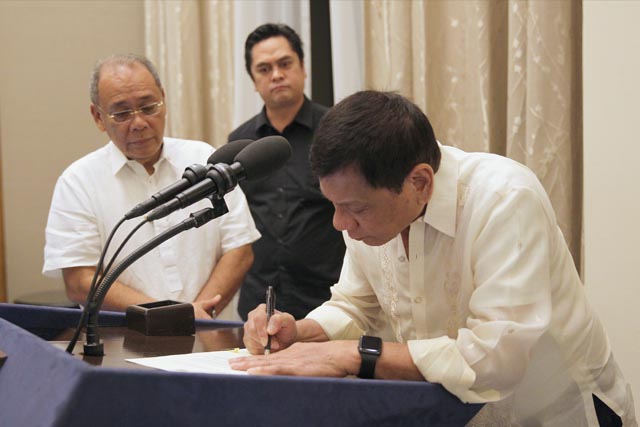
President Rodrigo Duterte on Tuesday signed into law the P3.8- trillion national budget for 2018 and the Tax Reform for Acceleration and Inclusion (TRAIN) law that is expected to generate P130 billion in revenues for the government.
Duterte expressed gratitude to lawmakers and to the Department of Budget and Management (DBM) headed by Secretary Benjamin Diokno for a budget that is “pro-people, pro-investment, pro-growth, and pro-development.”
Duterte said in his speech that the budget will benefit “the poor, the vulnerable, and those in the countryside.”
The DBM, for its part, added that it is a budget for “real change,” one that “represents the bold plans of the Duterte administration.”
At a ceremony in Malacañan, Duterte signed Republic Act 10963 or the TRAIN law that is a priority measure of the Duterte administration.
Revenues from the first package of the much-awaited program are meant to fund the Duterte government’s Build, Build, Build infrastructure program and socio-economic programs.
Under its P8.44-trillion 2017-2022 “Build, Build, Build” program, the government spending is expected to increase on infrastructure alone to P1.899 trillion, equivalent to 7.45% of the gross domestic product, on the end of Duterte’s term on 2022.
The next tax reform package is expected to be passed in early 2018.
Duterte inked the General Appropriations Act of 2018, about 12.4 percent more than the P3.35-trillion budget for 2017.
The Department of Education (DepEd), as required by the 1987 Constitution, received the biggest chunk of the budget with P553.3 billion.
Other agencies who shared the biggest allocations are the Department of the Interior and Local Government (DILG) with P170.8 billion, Department of National Defense (DND) with P149.7 billion, and Department of Social Welfare and Development (DSWD) with P141.8 billion.
The funds for the free tuition program for state universities and colleges were also included in the disbursement.